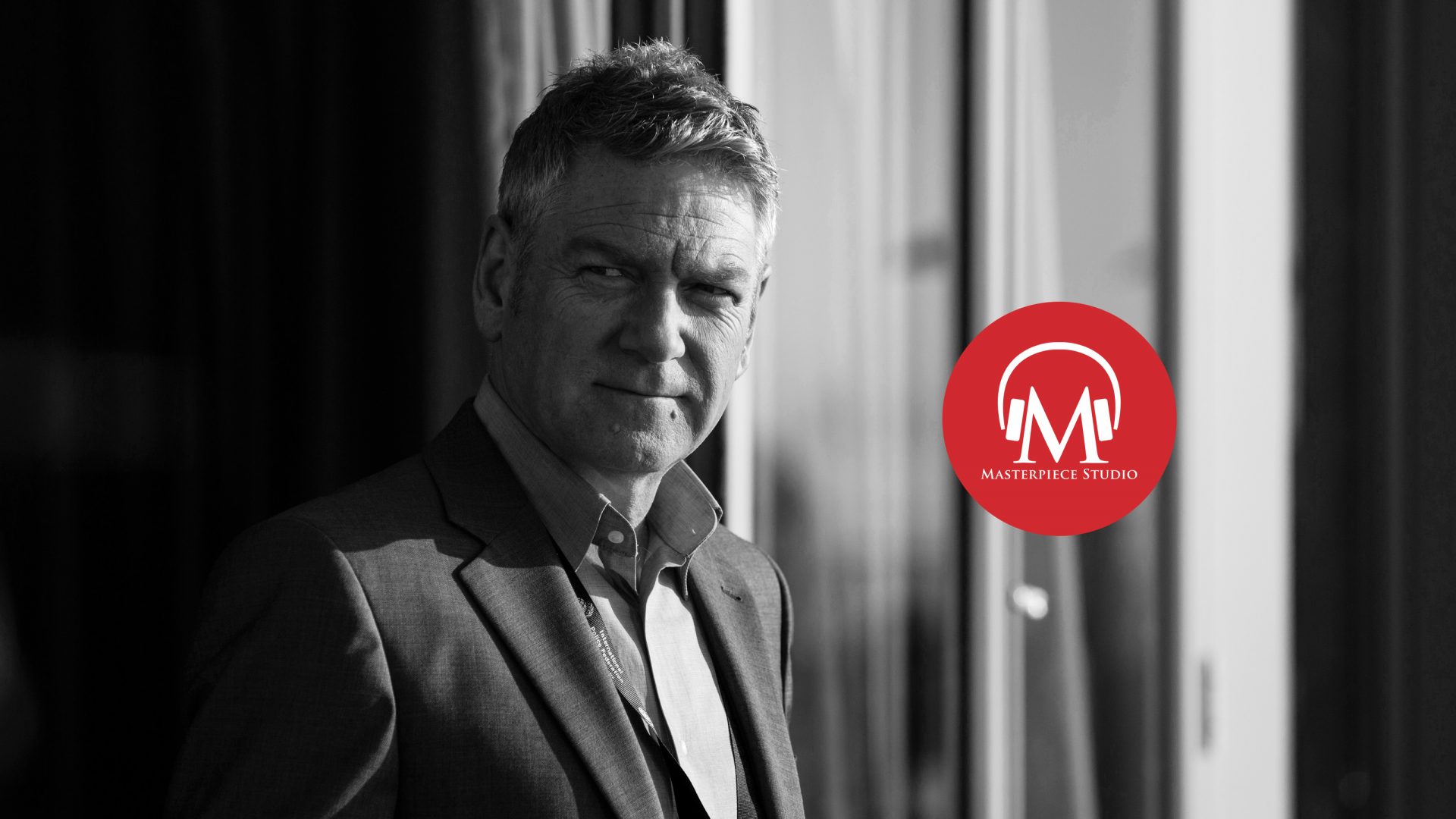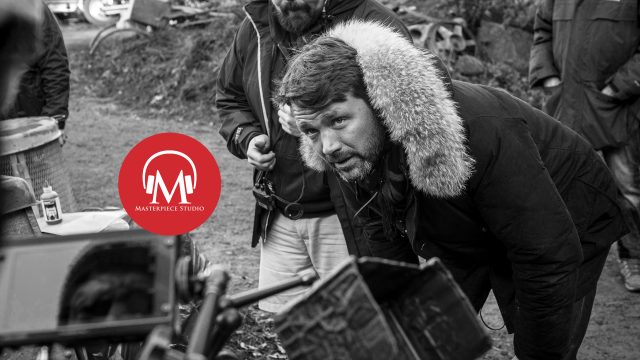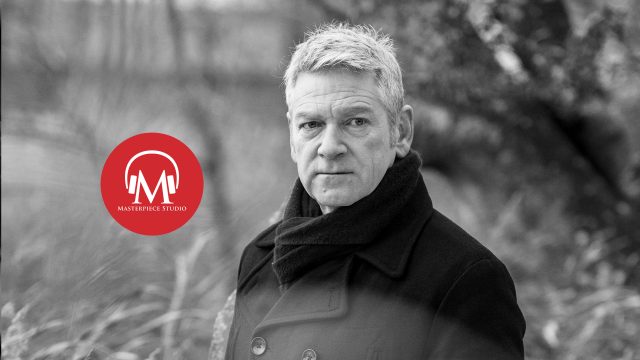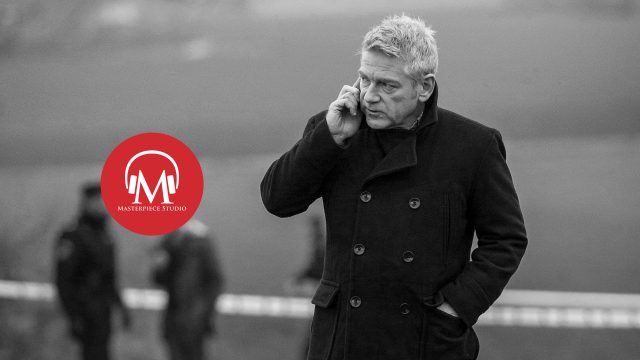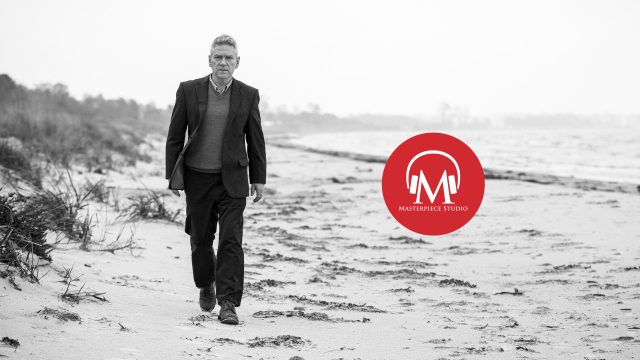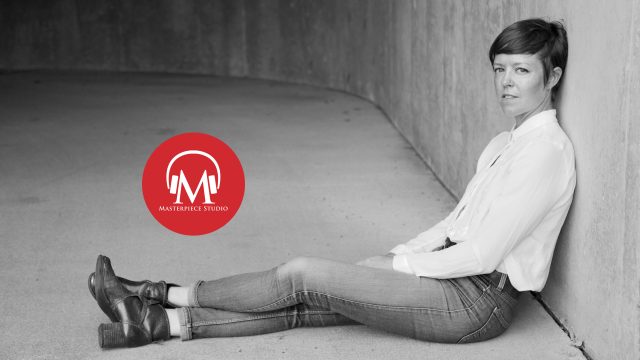Jace Lacob (Jace): MASTERPIECE Studio is brought to you by Audible. For a free trial, go to Audible.com/Masterpiece.
MUSIC: [“Nostalgia” performed by Emily Barker and the Red Clay Halo]
Tram wires cross Northern skies
Cut my blue heart in two
Jace: The Season 4 premiere of Wallander — “The White Lioness” — finds the brooding Swedish detective in the middle of yet another politically-charged murder investigation.
Like all of the episodes that precede it, “The White Lioness” is based on the Wallander novels written by the late Henning Mankell.
Unlike earlier episodes though, the premiere takes place in South Africa — not Southern Sweden — and opens on Wallander running… in shorts.
After three seasons of drinking heavily, eating poorly, and sleeping rarely, it seems like Wallander may be trying to make a positive change in both the world and — for once — his own life.
As actor Sir Kenneth Branagh puts it:
Kenneth Branagh: Often in Mankell’s writing he sets up in this case a significant development in Kurt Wallander’s life which is that he looks conspicuously as though he may be about to be happy.
Jace: And even though — by the end of the episode — Wallander is still struggling with the same existential issues that have plagued him since Season One…
CLIP:
Kurt: Do we make a difference?
Jace: He seems, at least, better equipped to cope.
In this episode, Kenneth Branagh — who plays Kurt Wallander — weighs in on the premiere and reflects on Wallander’s troubled past… and potentially bright future.
Jace: Welcome.
Kenneth Branagh (Kenneth): Thanks, Jace.
Jace: Now I wanted to take a look back. What do you make of the Wallander books when you first read them?`
Kenneth: I was captivated when I read the novels. I read the first … I suppose the first 8 or 9 were available to me when I first became aware of them. I was captivated by the landscape, his evocation of the flat lands full of cold and space inside which was a brooding, sad, melancholic man whose instinct nevertheless fundamentally seemed to be to do good.
For me, it was sheer pleasure. I had no concept at that time of playing in them, of them being adaptations. It was simply the pleasure of reading novels that I found to be transporting.
Jace: It’s hard to watch this final season without thinking of the recent death of Wallander creator Henning Mankell. What was your relationship with Mankell like and what did he make of the English language version of Wallander?
Kenneth: From what he said to us, he really, really enjoyed immensely the English language versions because they were quite the departure, I think. And he enjoyed, I think, our English take on Swedishness. And so they often surprised him. He was surprised by how I played it, how we did them, but very, very pleased.
My relationship with him from at least my point of view was really a very enjoyable one. He was a vibrantly alive character. I met him in the summer where those long white nights were something you could tell the Swedes absolutely loved because the winter was going to come soon and it would be hard, and the nights would be long. I saw him across all the rest of those seasons, and across the rest of the shows.
He was always engaged, always in the middle of writing something, always on his way somewhere. He traveled a great deal. I mean a deeply, in the nicest possible way, a deeply serious man. It was no small talk with him. He was…He was someone who…When he was in the room, you really, really paid attention, and he was a life force that it was really a great, sort of, privilege to encounter.
Jace: What do you think Mankell saw in you as Kurt Wallander that made him say “Yes, he should be Kurt?”
Kenneth: These things are so subjective. There were a couple of other wonderful actors who played this part, and I’m sure they had very sort of keen takes on it, but I think…I think that he liked the very openly sort of wounded quality that at least I found myself seeing in Kurt. And he encouraged very much my own individual reaction to Wallander, and this sort of open wound…that I felt him to be a man of such incredible sensitivity that it was almost painful. He was almost painfully exposed to be simpatica with the victims of crime so that everything that made him good as a policeman made him terrible as a human being. That sort of focus, that engagement, that preoccupation was something that Henning seemed to encourage and seemed to enjoy the fact that it came from a different direction.
He could not … I don’t know that he could recognize the Swede in me but he recognized the Wallander in me.
Jace: Kurt Wallander feels a great deal. He’s not just focused on matters of justice or detection but also with the notion of goodness. Do you feel that Kurt is an existential hero in that regard?
Kenneth: Well, he is someone who takes the business of being human seriously and maybe more seriously than is altogether good for his day to day functioning. It’s partly because he comes across violent crime and what that seems to reveal of human nature. So he’s transfixed by some of the horrors that are around him. I think he sees in very sharp detail where there is darkness, and indeed where there is kindness and he sort of lives and breathes in response to these things in a very personal way that across the films that we’ve made of his stories has cost him a great deal personally but also has developed him in lots of ways.
Jace: The first episode of the final season, The White Lioness finds Kurt in South Africa as he investigates the disappearance of Inga Hedeman.
CLIP:
Hedeman: The one place in the country you know she isn’t here and here you are.
Grace: This is Detective Kurt Wallander.
Kurt: I’m from Sweden. Ystad police.
Hedeman: Good. It’s about time. Maybe you can do something about finding my wife.
Jace: Does it make it more exciting or challenging to have Kurt out of his usual surroundings?
Kenneth: I enjoyed Kurt Wallander being a fish out of water. When he is, it makes you very, very alive and alert to your surroundings. He’s a great watcher and listener; good policeman have to be. So they become more than mere tourists in these new places.
And of course because it’s Wallander, he is quickly drawn into the world of a violent crime, and also a very volatile political situation.
CLIP:
Grace: Past evidence says that it’ll quadruple in value making Max Khulu a very rich man. Unless of course Bernie Mewiye’s elected and puts all these developments on hold.
Kurt: So 100,000 ren doesn’t seem like very much to invest in having Bernie Mauye killed.
Jace: Now how does the murder of Inga Hedeman and the assassination attempt shape the speech that Kurt is meant to give at the conference?
Kenneth: As always with Mankell and with Peter Harness who’s written these screenplays, is he draws, or attempts to draw ,some sort of conclusion about having worked for nearly 40 years in the police service. He asked the questions you expect of Kurt Wallander.
CLIP:
Kurt: Do we make a difference? Maybe. Sometimes. Not much.
Kenneth: What is the purpose of a life spent trying to combat violent crime if it continues to be on the streets of South Africa or Sweden?
He has a very personal encounter with that crime in which he’s drawn in because the victim is a Swedish national. As a result of his joining his local colleagues and investigating it, he’s forced to engage with the local political situation. The war between the haves and the haves-nots, the simmering racial tensions in South Africa.
CLIP:
[Speech continued] Recently I met a young man called Victor Mubasha. He was just a boy really…
Kenneth: The speech that he’s due to make at the police conference becomes one now completely and utterly informed by a first-hand experience of what it’s like to be in this case young, and black, and disenfranchised in modern South Africa.
Jace: This is the end of Kurt Wallander. What should fans expect from these final episodes?
Kenneth: Well, I think, as they might imagine, fans of the series might expect that Kurt Wallander’s going to be in a lot of trouble. Once again, in a small town more crime is going to go on than perhaps they think is entirely plausible but somehow it does.
In the middle of it not only is Kurt intimately involved in the crimes unfolding, but he’s also personally, deeply involved in a further collapse not just of law and order but his own mental and emotional state. He faces it all with his usual combination of a pigheadedness, but at all times this sort of intensely human quality. Un-heroic, he’s just a little guy in a town in Sweden but he’s also a kind of every man.
I hope that those who’ve stuck with the series over the years will feel that it’s a rich conclusion to a singular journey.
Jace: Catch the next episode of this three-part final season of Wallander Sunday, May 15th at 9 pm ET on MASTERPIECE.
Then after the show, it’s Round Two with Kenneth Branagh! He’ll return to the podcast to take us behind the scenes of the second episode, and into the mind of Kurt Wallander.
CLIP:
Kenneth Branagh: I’d find after just a few days in Ystad just beginning to work on Kurt again, you’d look in the mirror and think, “God I’ve aged a bit, haven’t I?”
Jace: If you’re new to the MASTERPIECE Studio podcast, you can listen to past episodes of the show — including our interviews with the cast and crew of Grantchester and Downton Abbey — at pbs.org/masterpiece and on Stitcher and iTunes.
Once you’re there — leave us a review. They help us to move up the charts and make it easier for others to find us. Plus, we love to hear what you think of the show.
MASTERPIECE Studio is hosted by me, Jace Lacob. Kathy Tu is our editor. Rachel Aronoff is our production coordinator. Special thanks to Barrett Brountas and Nathan Tobey. The executive producer of MASTERPIECE is Rebecca Eaton.
MASTERPIECE Studio is brought to you by Audible.
Sponsors for MASTERPIECE on PBS are Viking River Cruises, Audible, and The MASTERPIECE Trust.








